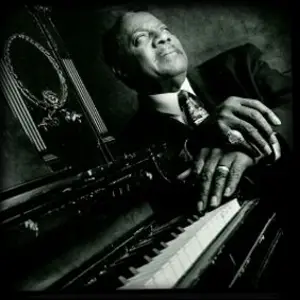 Johnnie Johnson’s driving, boogie piano was a key factor in the success of Chuck Berry’s music, and the title ‘Johnny B. Goode’ is said to be a reference to Johnnie’s rumbunctious behaviour when he was drinking. Credited with getting Chuck started and then sticking with him for twenty years, Johnnie had a late-blooming solo career which attracted the help of some very big Blues stars. Johnnie’s combination of R&B, swing and boogie piano styles and his songwriting and arranging talents produced some of the most exciting music of the day.
Johnnie Johnson’s driving, boogie piano was a key factor in the success of Chuck Berry’s music, and the title ‘Johnny B. Goode’ is said to be a reference to Johnnie’s rumbunctious behaviour when he was drinking. Credited with getting Chuck started and then sticking with him for twenty years, Johnnie had a late-blooming solo career which attracted the help of some very big Blues stars. Johnnie’s combination of R&B, swing and boogie piano styles and his songwriting and arranging talents produced some of the most exciting music of the day.
Born in Fairmont WV in 1924, Johnnie Clyde Johnson’s mother bought a piano when he was four and encouraged him to play. The family had a good selection of Blues records and Johnnie would copy Art Tatum and
Meade ‘Lux’ Lewis tracks he heard on the radio. Drafted into the Marines in WWII, Johnnie joined the servicemen’s band The Barracudas, which toured the Pacific theatre, and when he was de-mobilised he settled in
Chicago. Johnnie played the Blues clubs there, sitting in with
Muddy Waters and
Little Milton among others, before moving to St. Louis to start his own band. The Sir John’s Trio featured Johnnie backed by the drums of Ebby Hardy and Alvin Bennett’s sax, but when Alvin was ill just before a New Years Eve gig in 1953, Johnnie called a young country-style guitarist called
Chuck Berry to fill in. Chuck’s showmanship fronting the band convinced Johnnie he was onto something, so they went to Chicago where Muddy Waters introduced them to
Leonard Chess. They recorded a version of the country song, ‘Ida Red’ but changed the title to ‘Maybelline’ after a brand of make-up. Suddenly Chuck and Johnnie had a hit record and a recording deal with the hottest label in R&B.
Johnnie pounds the 88s on ‘Sweet Little Sixteen’ which he claimed to have co-written;
‘Maybelline’ went to No. 5 in the Billboard Hot 100 and topped the R&B charts, and almost every thing Chuck recorded in the next 10 years went into the charts. Johnnie usually took care of the arranging, but Chuck took composing credits, and royalties, for almost all the songs. Johnnie later sued for co-writing credit on dozens of tracks but the case failed because it was out of time. At least Johnnie was immortalised in the title of ‘Johnny B. Goode’, supposedly a reference to his behaviour when drunk, and this track was blasted beyond the solar system on the spacecraft Voyager, carrying ‘The Golden Record’ of Earth’s best cultural achievements. Johnnie stayed in Chuck’s band until 1973 when he tired of the gruelling slog of touring, although he appeared with Chuck as a guest from time to time.
Live version of Johnnie’s ‘Tanqueray’;
Johnnie Johnson Discography
This was Johnnie’s major label debut and he sounds like he is having great fun with his young friends Eric Clapton and Keef Richards.
JOHNNIE B. BAD
Johnnie spent 15 years out of the limelight, and probably drinking too much, until Chuck’s 1987 film ‘Hail, Hail Rock’n’Roll’ re-ignited his career. A solo album ‘Blue Hand Johnnie’ soon followed and Johnnie guested on Keef Richards’ X-pensive Winos solo album, ‘Talk is Cheap’. Keef returned the favour when he appeared with
Eric Clapton on ‘Johnnie B Bad’ in 1991. Johnnie gave up the bottle and returned to touring again, sharing the stage with
John Lee Hooker,
Bo Diddley and
George Thorogood, and featuring on George’s ‘Let’s Work Together’ album. Johnnie’s 1999 biography, ‘The Father of Rock’n’Roll’ came with a CD of new recordings of his and Chuck’s music. To celebrate a major Birthday, he recorded ‘Johnnie B. Eighty and Still Bad!’, but sadly he died on the day the record was released in 2005.
 Johnnie Johnson’s driving, boogie piano was a key factor in the success of Chuck Berry’s music, and the title ‘Johnny B. Goode’ is said to be a reference to Johnnie’s rumbunctious behaviour when he was drinking. Credited with getting Chuck started and then sticking with him for twenty years, Johnnie had a late-blooming solo career which attracted the help of some very big Blues stars. Johnnie’s combination of R&B, swing and boogie piano styles and his songwriting and arranging talents produced some of the most exciting music of the day.
Johnnie Johnson’s driving, boogie piano was a key factor in the success of Chuck Berry’s music, and the title ‘Johnny B. Goode’ is said to be a reference to Johnnie’s rumbunctious behaviour when he was drinking. Credited with getting Chuck started and then sticking with him for twenty years, Johnnie had a late-blooming solo career which attracted the help of some very big Blues stars. Johnnie’s combination of R&B, swing and boogie piano styles and his songwriting and arranging talents produced some of the most exciting music of the day.